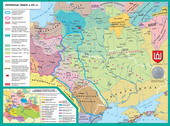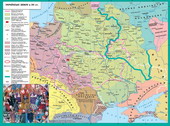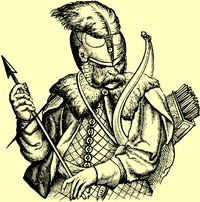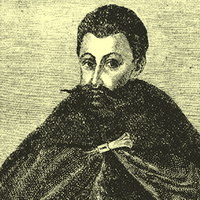Ukrainian lands ruled by Lithuania and Poland in late 1914 - in the first half of the 16 century.
Plan presentation
- Liquidation Ukrainian autonomous principalities.
- Strengthening the Polish influence on Ukrainian land.
- Rise of the Lithuanian-Ruthenian nobles led by Prince Svidrigaylo.
- recovery and eventual liquidation of Kyiv and Volyn autonomous principalities.
- «Conspiracy Rus princes».
Timeline
|
1432-1435 he |
struggle of Ukrainian and Belarusian princes led Svidrigaylo for the independence of Belarus and Ukraine from Poland. Formation of the Great Duchy of Rus' " |
|
1452 |
Liquidation Volyn local prince |
|
1455-1470 he |
ruling Simeon Olelkovycha |
|
1471 |
Liquidation of Kyiv local prince and his conversion to Province |
|
1481 |
"conspiracy Rus princes" |
|
1508 |
Speech Duke Mikhail Glinsky |
Personality
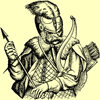 Svydryhajlo - Olgerd Hedyminovycha son, younger brother of Jagiello. After the death of Vytautas declared Lithuanian Grand Duke. In 1432 as a result of collusion Lithuanian and Polish magnates led by Sigismund Keystutovychem Svydrygailo removed from the grand throne. Thu long struggle for power with Sigismund in the Grand Duchy of Lithuania, where he supported the Ukrainian princes (Sigismund refused to recognize the rule and, according to the chronicler, Svydrygailo planted a "grand reign of Rus"). In 1435 Svydrygailo troops were defeated by the armies of Sigismund in Vilkomyrskiy battle.
Svydryhajlo - Olgerd Hedyminovycha son, younger brother of Jagiello. After the death of Vytautas declared Lithuanian Grand Duke. In 1432 as a result of collusion Lithuanian and Polish magnates led by Sigismund Keystutovychem Svydrygailo removed from the grand throne. Thu long struggle for power with Sigismund in the Grand Duchy of Lithuania, where he supported the Ukrainian princes (Sigismund refused to recognize the rule and, according to the chronicler, Svydrygailo planted a "grand reign of Rus"). In 1435 Svydrygailo troops were defeated by the armies of Sigismund in Vilkomyrskiy battle.
main presentation
1. Liquidation of Ukrainian autonomous principalities
By Vytautas - Board (1392-1430 biennium) many Lithuanian princes, who had portions in Russia-Ukraine was deprived of possession.
The independence of autonomous principalities - concerned about the grand duke. For the establishment and consolidation of his power, he contributed their efforts to eliminate the largest principality, urivnyaty princes of the boyars.
- Liquidation autonomous principalities for princely stratum mean restriction of their rights.
- united against such a policy Vitebsk Svydryhajlo Olgerdovich Prince, Prince Dimitri Siverskyi Olgerdovich Korbut, Kyiv prince Volodymyr Olgerdovich Podolsky and Prince Theodore Koriatovych.
- These princes were against the submission of their lands new Polish-Lithuanian Commonwealth.
- confrontation escalated into military conflict in which the separate rulers were defeated.
- Earth Dmytro Korbut-handed Duke Vytautas Theodore Lyubartovychu whom were selected before him Volyn patrimony.
- could not hold portion Koriatovych and Theodore, who ruled on the tail after the death of his three brothers. This deprived the Duke Vytautas drawing of lot, too, in 1393
- Year in 1394, he drove from the Kievan land Volodymra Olgerdovich and conveyed this portion Skyrhaylu brother.
And - ruled in Kiev Skyrhaylo Olgerdovich short: the story chronicles, soon after he was poisoned. Became established in Kyiv Prince Ivan Olhymuntovych Hol'shans'kyj.
Thus, during 1393-1395 he was deprived of the Shares have been worst of princes.
Duke Vytautas policy aimed at eliminating the largest shares of independence, attacked the Ukrainian state, because it is separate principalities statesman idea embodied in the lands of Rus-Ukraine that were in the Grand Duchy of Lithuania.
2. Strengthening the Polish influence on the Ukrainian land
But even as
resisted Vytautas Krevsk Union, to counter the strengthening of the Polish influence he could not.
Search - support Vytautas led Polish defeat in the battle against the Tatars in 1399 on the river Vorskla.
- Under the agreement, signed in Vilnius in 1401, Vytautas was declared winner for life Grand Duchy of Lithuania, but after the death of all his land had to go back into Poland.
It was restored - conditions Krevsk Union. However Vytautas eventually returned to its former glory. Especially his reputation has grown after Battle of Grunwald, where it was a crippling blow Teuton Knight (1410).
- Winning the Battle of Grunwald Polish forced policy makers agreed to significant concessions to the Lithuanians. It also influenced the destiny of the Ukrainian lands.
- Year 1411 Polish King Jagiello passed Vitovtov life tenure in Western skirts.
- Under the agreement concluded in 1412 in Hungary Lyuboml abandoned in favor of Poland and Lithuania from its claim to Galicia and Podolia. Under the agreement have those Ukrainian lands could not only Poles, but the Lithuanians.
Horodelska Union
- Changes in the Polish-Lithuanian relations was approved in October 1413 Diet at the joint in town Horodli .
Then - approved Horodelsku Union, once again reaffirmed the Polish-Lithuanian convergence, while proclaiming saving grand table in Lithuania.
- That is the Great Duchy of Lithuania was approved certain state law, albeit under the supremacy of the Polish king.
 to Ukrainian lands new Polish-Lithuanian agreement had undesirable result: it particularly included the appointment to senior government positions only Grand Duchy of Lithuania, Lithuanian Catholics, which significantly limited the rights of the Orthodox Ukrainian elite, which to achieve public office had to deny their ancestral faith and then - and nationality.
to Ukrainian lands new Polish-Lithuanian agreement had undesirable result: it particularly included the appointment to senior government positions only Grand Duchy of Lithuania, Lithuanian Catholics, which significantly limited the rights of the Orthodox Ukrainian elite, which to achieve public office had to deny their ancestral faith and then - and nationality.
3. Rise of the Lithuanian-Ruthenian nobles led by Prince Svidrigaylo
After the death of Vytautas - 1430 Grand Dukes of Lithuania was proclaimed Prince Svydrygailo Olgerdovich.
- It is far more active than its predecessor started to implement policies to break the union with Poland and the Grand Duchy of Lithuania gaining independence.
- In response to Poland, which generally would rather not have the Grand Duke of Lithuania, began hostilities.
Orientation
Svydrygailo to Ukrainian and Belarusian nobility caused discontent Lithuanians, and with the support of Polish Lithuanian Grand Duke Vytautas's brother was proclaimed - Sigismund.
- removal from power Svydrygailo 1432 outraged supporters of the prince.
- They refused to recognize the power of Sigismund, who restored the union with Poland.
- According to the chronicler, « Ruthenian princes and boyars Prince put on Svydrygailo great reign Ruske.
- contemporaries perceived this event as a Grand Duchy of Lithuania division into two states - Lithuanian and Ruthenian.
- The latter, researchers sometimes call it Ukrainian-Belarusian state, logged in Kiev region, Chernigov-Siverschyna, Volyn, Eastern Podolia, Smolensk, Polotsk Vitebschiny and land.
- next few years Polish and Lithuanian nobles, who focused on Poland, tried to subdue by force of arms and Svydrygailo Russians return of land under the rule of Grand Duke of Lithuania.
- events, that determined the fate of the uprising Svydrygailo was Battle Vilkomyrom (currently Ukmerge city in Lithuania).
- Sicha under Vilkomyrom held in 1435 was .
- in that battle came the army of Grand Duke of Lithuania Sigismund, reinforced by Polish troops, and troops Svydrygailo, who headed the Ukrainian-Belarusian nobility in the struggle for their rights.
- Svydrygailo forces were severely defeated.
Grand Duchy of Rus' Revolt against pro-Polish and Polish and Lithuanian prokatolytsky minded tribal notables after an unsuccessful battle is little chance of winning.
4. Recovery and final liquidation of Kyiv and Volyn autonomous principalities
- However, still almost 100 years, representatives of the Ukrainian aristocracy resisted attack powers of the Lithuanian and Polish Catholics.
- Thus, in 1440 Volyn Prince Ivan and Alexander Chortoryyski organized conspiracy and killed the Grand Duke of Lithuania Sigismund.
- Immediately after the Ukrainian lands rebellion broke out against Lithuania.
- They became such a force and scope that the Lithuanian nobles had to restore the separate Kyiv and Volyn principality. Prince of Kiev was Olelko (Alexander), son of the Grand Prince Vytautas scrapped Olgerdovich Vladimir, Volhynia - Svydryhajlo.
Olelkovychi
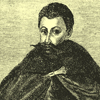 Olelko V. (1441-1454 biennium) and his son Simeon Olelkovych (1455-1470 biennium) continued to Kiev Vladimir Olgerdovich policy table.
Olelko V. (1441-1454 biennium) and his son Simeon Olelkovych (1455-1470 biennium) continued to Kiev Vladimir Olgerdovich policy table.
- In Kyiv, Pereyaslav and Bratslavshchina possession Olelkovychiv spread to Chernihiv-Siver ground.
- Much was done in defense of Kyiv land, including renewed strengthening borderland castles - Lyubech, Island, Kano, Cherkassy, Zvenigorod, etc..
- opened the restoration of Kyiv's churches: Church of Our Savior in Brest, the Dormition Cathedral of Kyiv Pechersk Monastery.
However - strengthening Ukrainian principalities contrary policy of Lithuania and Poland. Therefore, once again restored the principality was eliminated : Volyn in 1452 after the death Svydrygailo and Kiev - 1471 after the death of Semen Olelkovycha.
Earth liquidated Lithuanian principalities were transferred vicars, the rule actually vstanovlyuvalosya strangers.
5. "Collusion Rus princes»
Liquidation autonomous principalities sparked protests Rus princes.
- Year 1481 descendants of Vladimir Olgerdovich Michael Olelkovych, Theodore Belsky and John Hol'shans'kyj conspired to remove from power the Lithuanian Grand Duke Casimir, who was also a Polish king, but instead put on Great-Michael Olelkovycha table.
However - conspiracy was uncovered. Death penalty Olelkovycha Jr. put the last point in the fate of the local prince of Kiev, because since the chronicler wrote, «Kyiv ceased to be rulers, and magistrates instead of princes».
- next and, indeed, the latest attempt to restore the independence of the Ukrainian lands by force of arms from the prince was rebellion Michael Glinsky 1508, but it failed.
Consequently, attempts by the Ukrainian aristocracy maintain Ukrainian statehood have not been successful. Elimination of autonomous principalities to a loss of stratum princely statehood status, which she performed a carrier.
- the XV - beginning of the XVII century. rulers tried to prevent consolidation of important offices, governments, as if saying untitled nobility.
- to strengthen Polish influence among candidates for office have an advantage, particularly in crown lands, the Romans.
- This circumstance forced the move to the Catholic religion princely family. Made, and mixed marriages with representatives of Polish aristocratic families.
Yes - Ukrainian and Belarusian lands gradually lost prince layer.
- Without national elite, able to hold public office, that represent the state, the state uryvalysya tradition.
 English
English
 Svydryhajlo - Olgerd Hedyminovycha son, younger brother of Jagiello. After the death of Vytautas declared Lithuanian Grand Duke. In 1432 as a result of collusion Lithuanian and Polish magnates led by Sigismund Keystutovychem Svydrygailo removed from the grand throne. Thu long struggle for power with Sigismund in the Grand Duchy of Lithuania, where he supported the Ukrainian princes (Sigismund refused to recognize the rule and, according to the chronicler, Svydrygailo planted a "grand reign of Rus"). In 1435 Svydrygailo troops were defeated by the armies of Sigismund in Vilkomyrskiy battle.
Svydryhajlo - Olgerd Hedyminovycha son, younger brother of Jagiello. After the death of Vytautas declared Lithuanian Grand Duke. In 1432 as a result of collusion Lithuanian and Polish magnates led by Sigismund Keystutovychem Svydrygailo removed from the grand throne. Thu long struggle for power with Sigismund in the Grand Duchy of Lithuania, where he supported the Ukrainian princes (Sigismund refused to recognize the rule and, according to the chronicler, Svydrygailo planted a "grand reign of Rus"). In 1435 Svydrygailo troops were defeated by the armies of Sigismund in Vilkomyrskiy battle.
 Olelko V. (1441-1454 biennium) and his son Simeon Olelkovych (1455-1470 biennium) continued to Kiev Vladimir Olgerdovich policy table.
Olelko V. (1441-1454 biennium) and his son Simeon Olelkovych (1455-1470 biennium) continued to Kiev Vladimir Olgerdovich policy table.